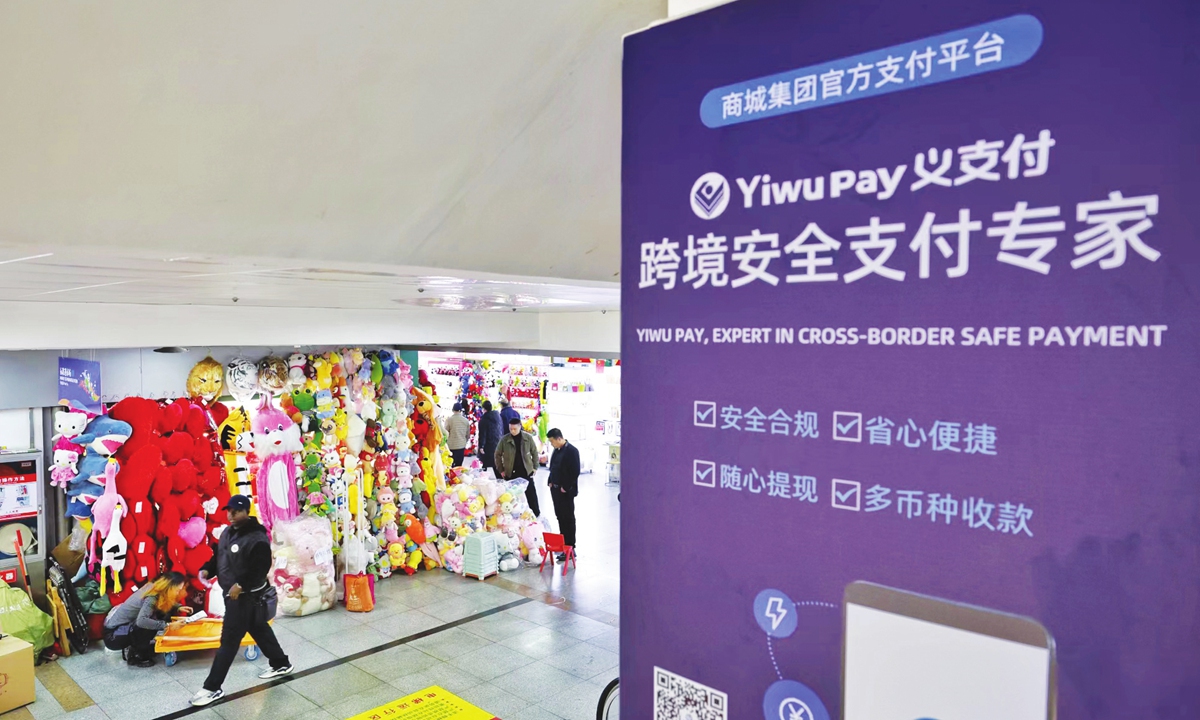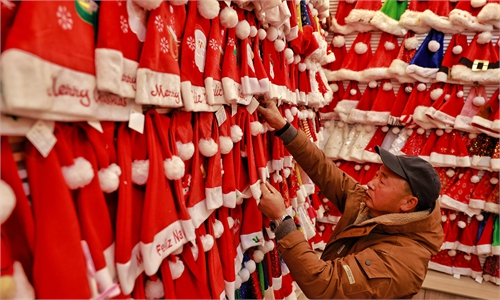
A trader walks past a promotional banner for Yiwu Pay at the Yiwu International Trade Market on December 4, 2023. Photo: Li Hao/GT
With Christmas around the corner, cities in the US and Europe are in festive mode, and shoppers are busy buying last-minute Christmas decorations and gifts. Many of the dazzling Christmas goods on offer have a common origin - Yiwu in East China's Zhejiang Province, the world's largest wholesale market for small commodities.Local customs data showed that in the first three quarters of 2023, Yiwu's total trade hit 432.1 billion yuan ($60.98 billion), up 22 percent year-on-year. Exports were up 18.9 percent at 383.13 billion yuan.
Some of these exports were Christmas products. According to available statistics, Yiwu's first-half exports of Christmas products rose 17.8 percent year-on-year.
Based on actual cross-border payment and settlement needs, Yiwu Pay, a global payment platform aimed at facilitating the city's small commodities merchants to connect with the world while reducing their payment risks, has experienced rapid development, particularly as the US intensifies its containment of Chinese manufacturing.
As of the end of September, Yiwu Pay had served 470,000 merchants, settled funds of 1.3 trillion yuan, and seen its business coverage expand to 138 countries and regions, recording more than 200 million transactions.
Payment systems are an important part of trade digitalization reform and a crucial process in international trade transactions. According to the Yiwu government, vendors in 176 countries and regions conducted cross-border yuan settlements with Yiwu in 2022, with the total amount reaching 56.54 billion yuan, a year-on-year increase of 56.23 percent.
Despite the challenges posed by the global economic slowdown and the push for supply chain de-risking by the US and some Western countries, Yiwu has managed to sustain the vitality of its cross-border trade. This success can be attributed, in large part, to the local businesses' keen market awareness and their ability to adapt to and explore new markets. Despite this strong start, Yiwu Pay may still face challenges as it moves forward.
Even as world trade is hit by de-globalization, cross-border payments are on the rise in China.
On one hand, with the growing demand for global tourism, shopping, education and investment, the need for cross-border payments is increasingly strong. On the other hand, the Chinese government has announced policies to encourage and support the development of the cross-border payment business.
China's third-party cross-border payment sector is expected to have a strong performance this year, with the market estimated to reach 1.69 trillion yuan, according to Chinese media reports.
Needless to say, in the face of such a big market "cake," competition will become increasingly fierce. Yiwu Pay's potential rivals will include not only overseas internet giants, but also China's top internet companies.
From another perspective, Yiwu Pay serves the foreign trade needs of local small commodities businesses, which are regarded as representative of China's manufacturing sector and comprise an irreplaceable link in global industry, supply and trade chains. So, Yiwu Pay's development relies mainly on the support of Yiwu's foreign trade prospects.
However, since squeezing Chinese factories out of these same chains has become a top political priority in Washington, Yiwu's businesses will face more difficulties and challenges amid this geopolitical pressure.
How Chinese manufacturing transforms and upgrades to break through the containment is critical for both Chinese factories and the cross-border financial settlement and payment industry.
China's push for cross-border trade and payment development won't stop in the face of obstacles. Bit by bit, Yiwu has grown from a small city to one that contributes so much to global trade, and now there is every reason to believe that spirit will lead us to more markets.



